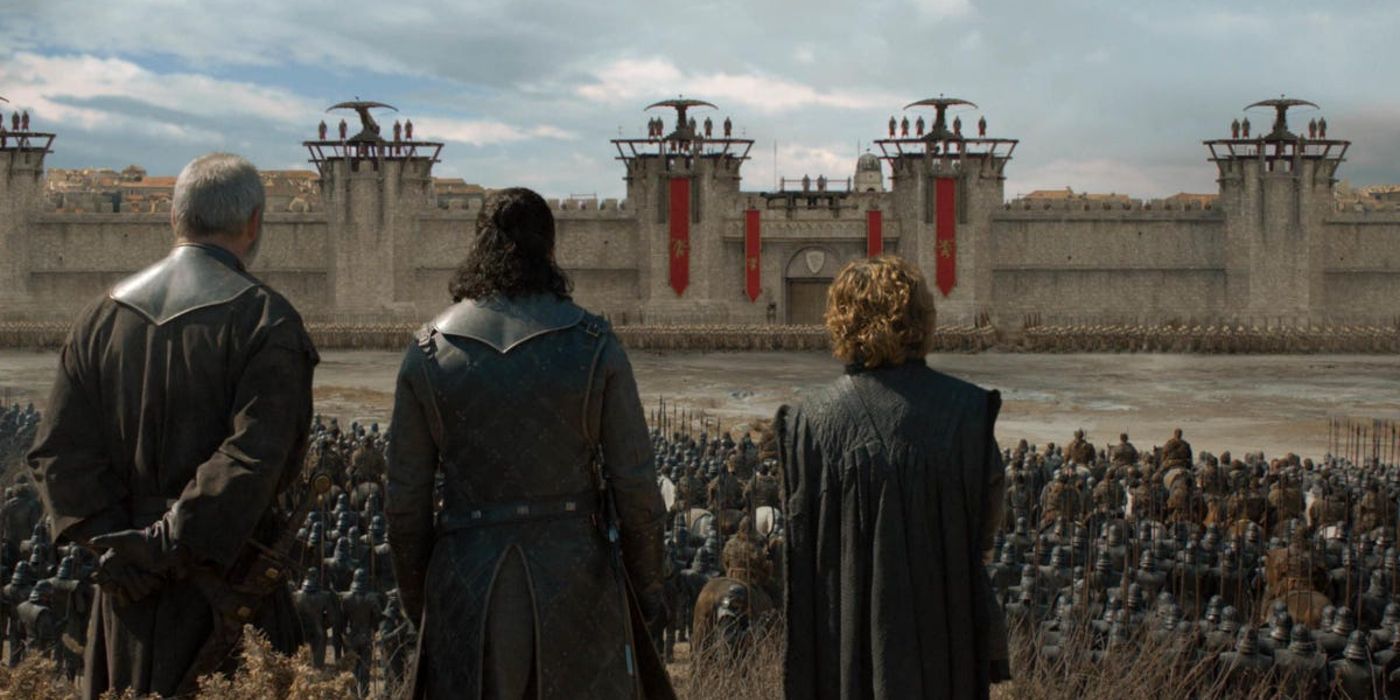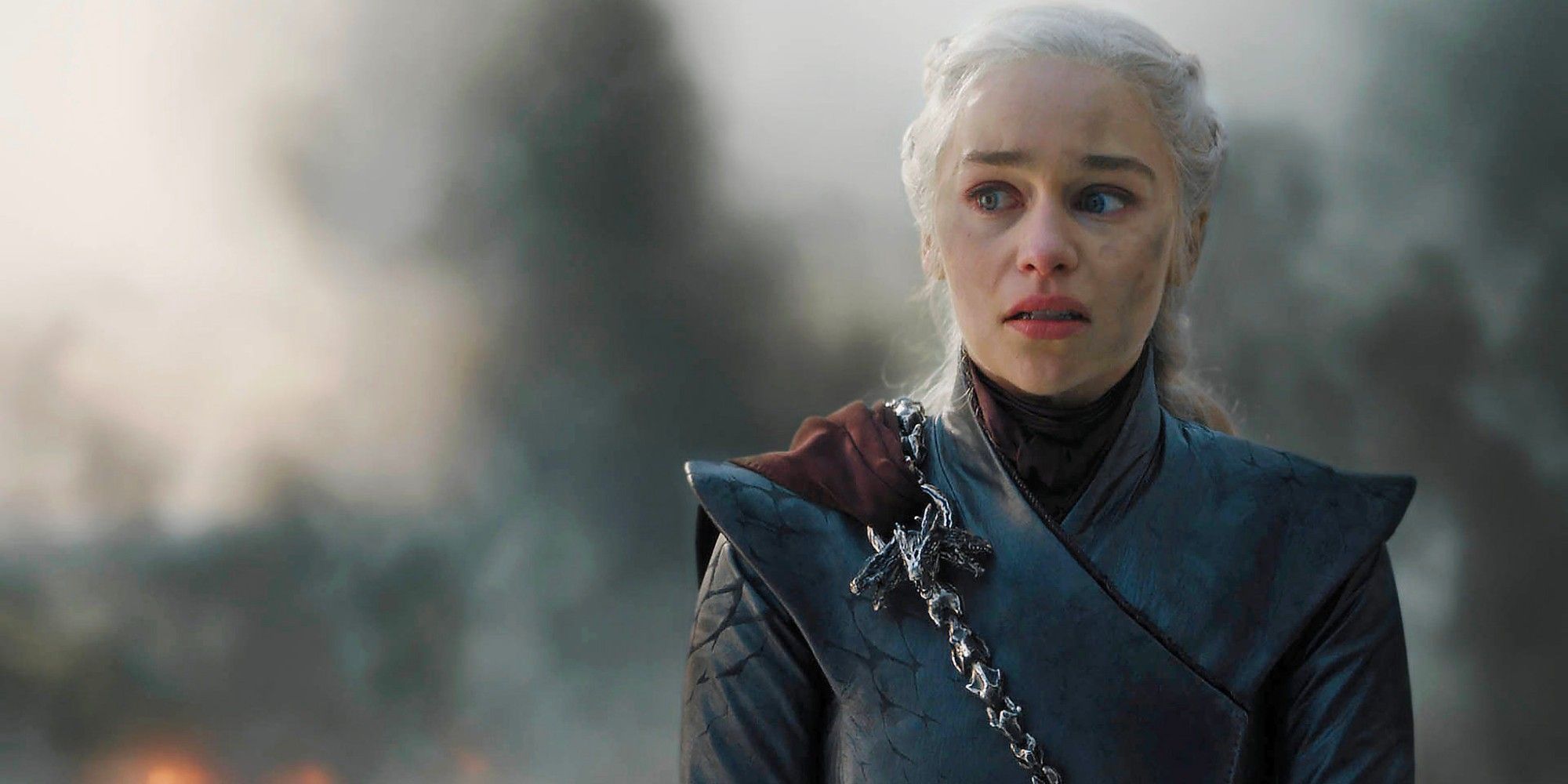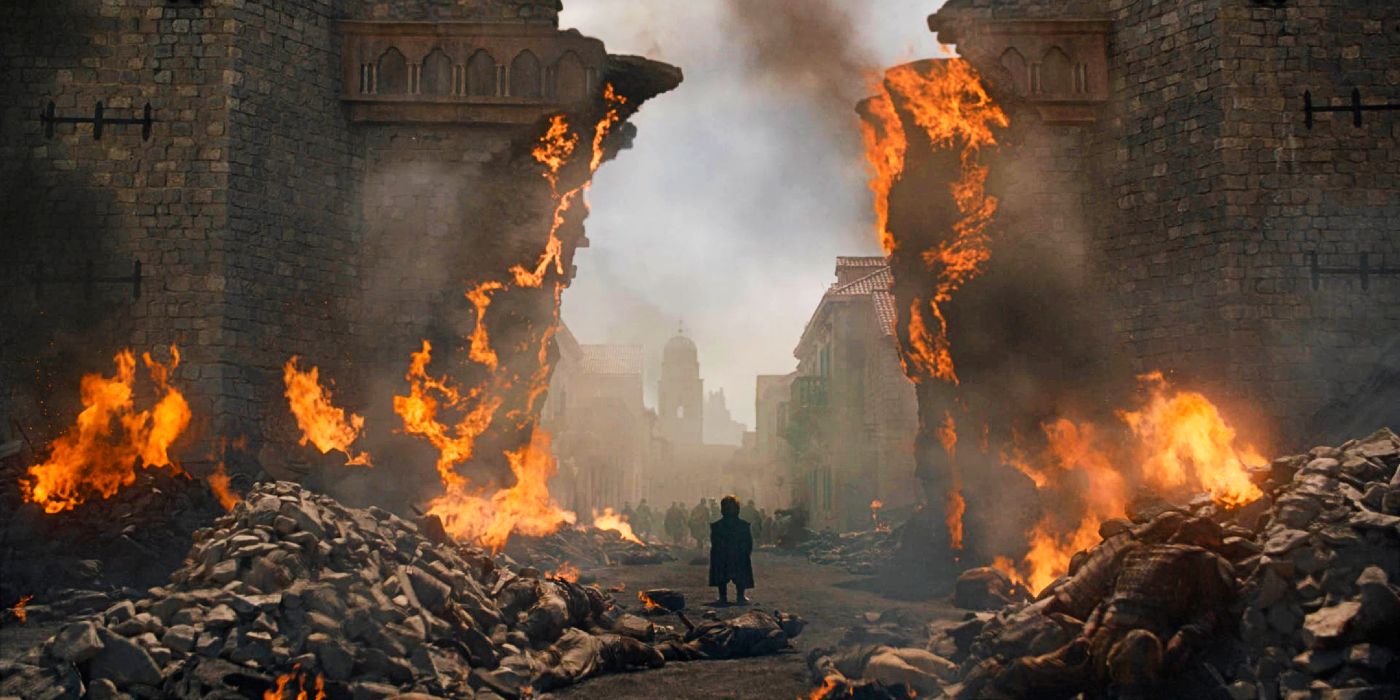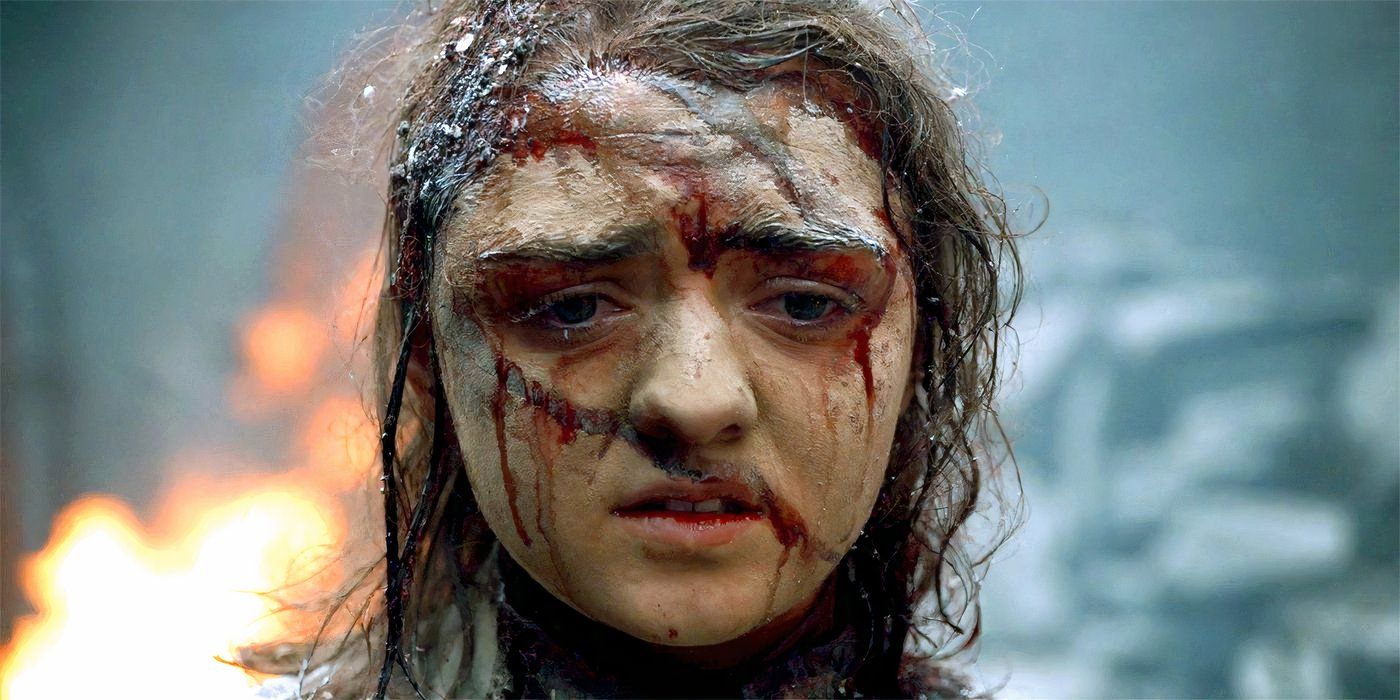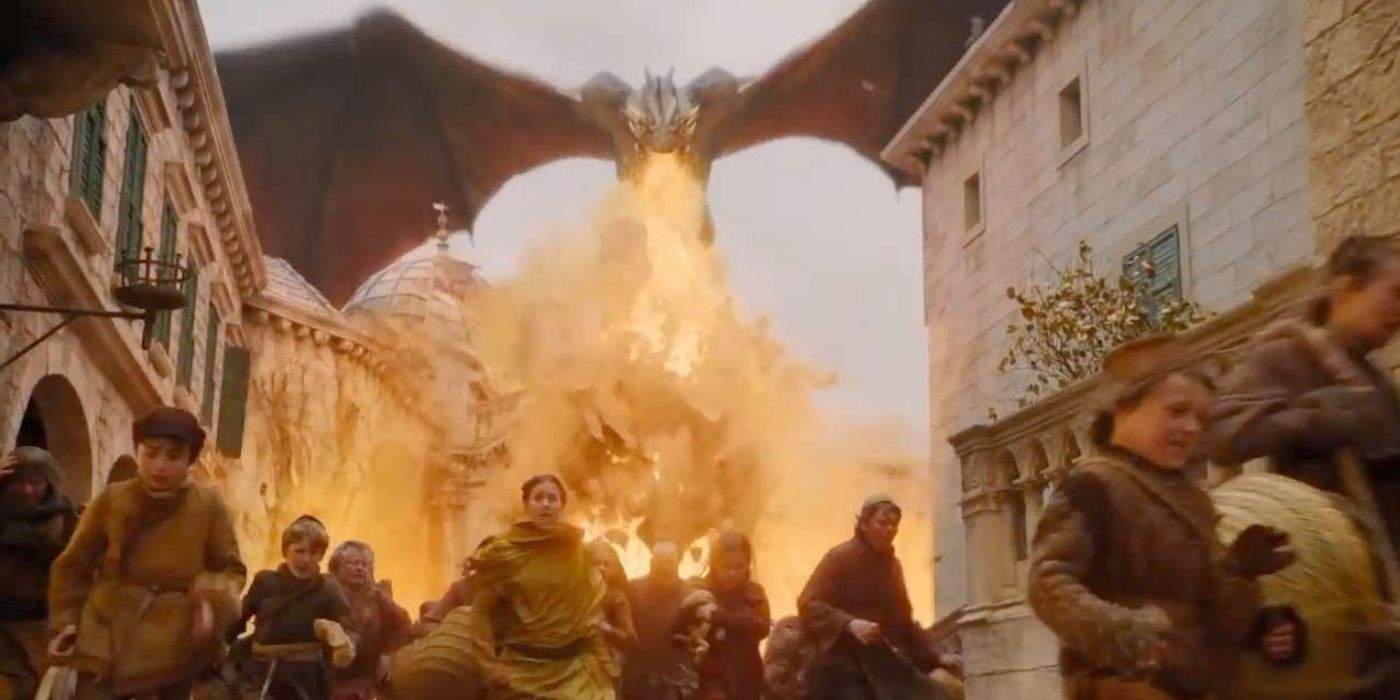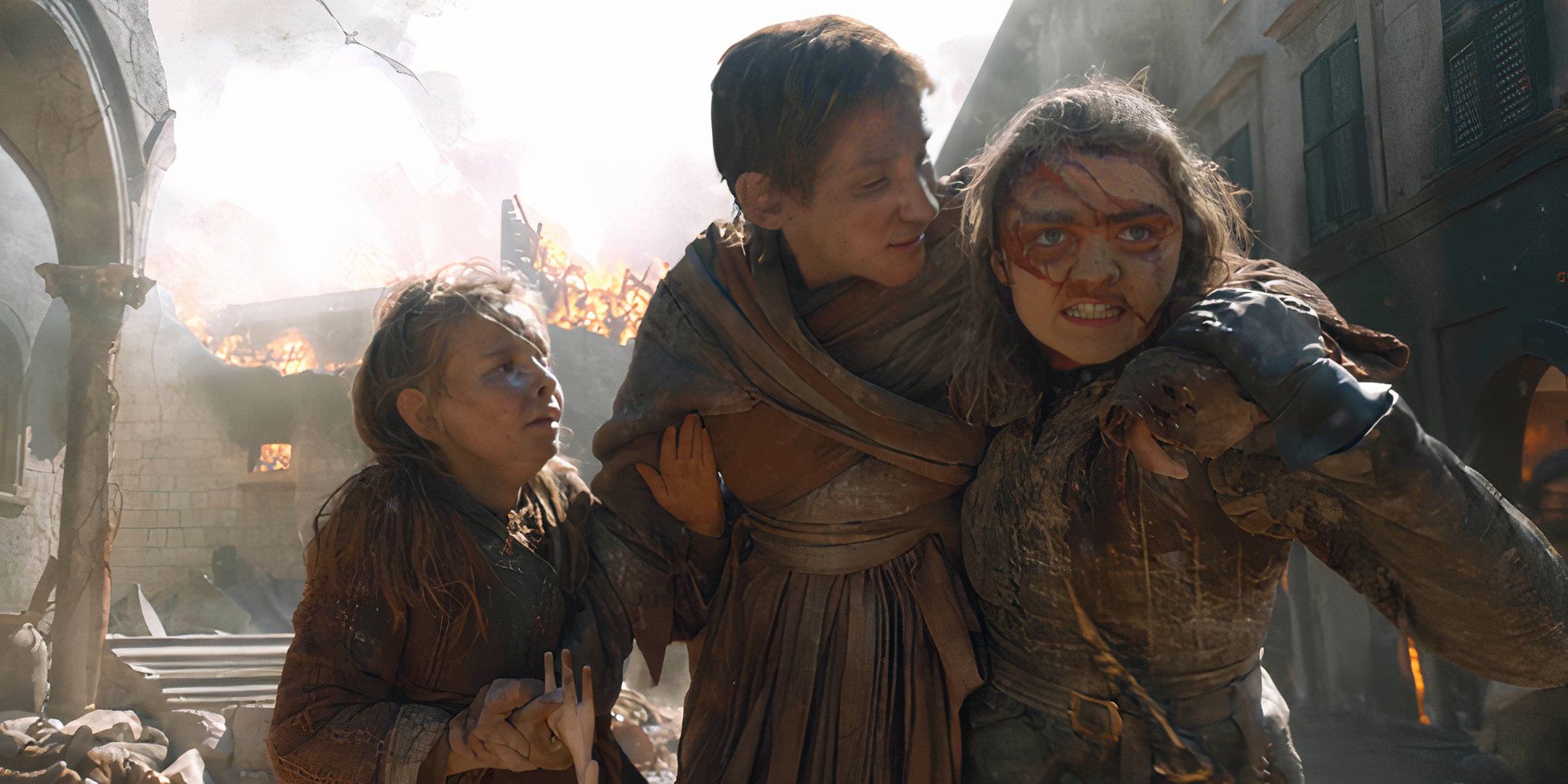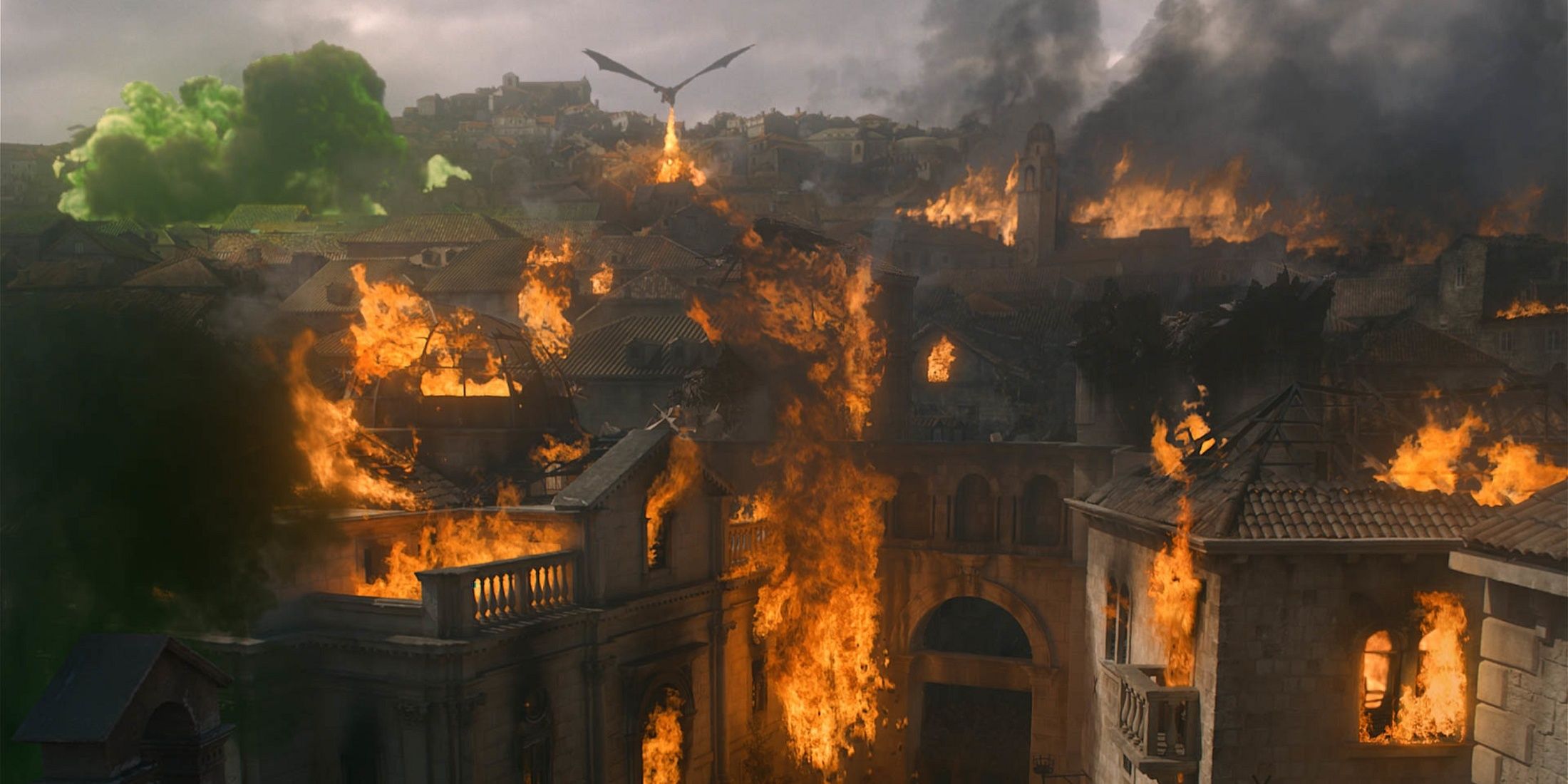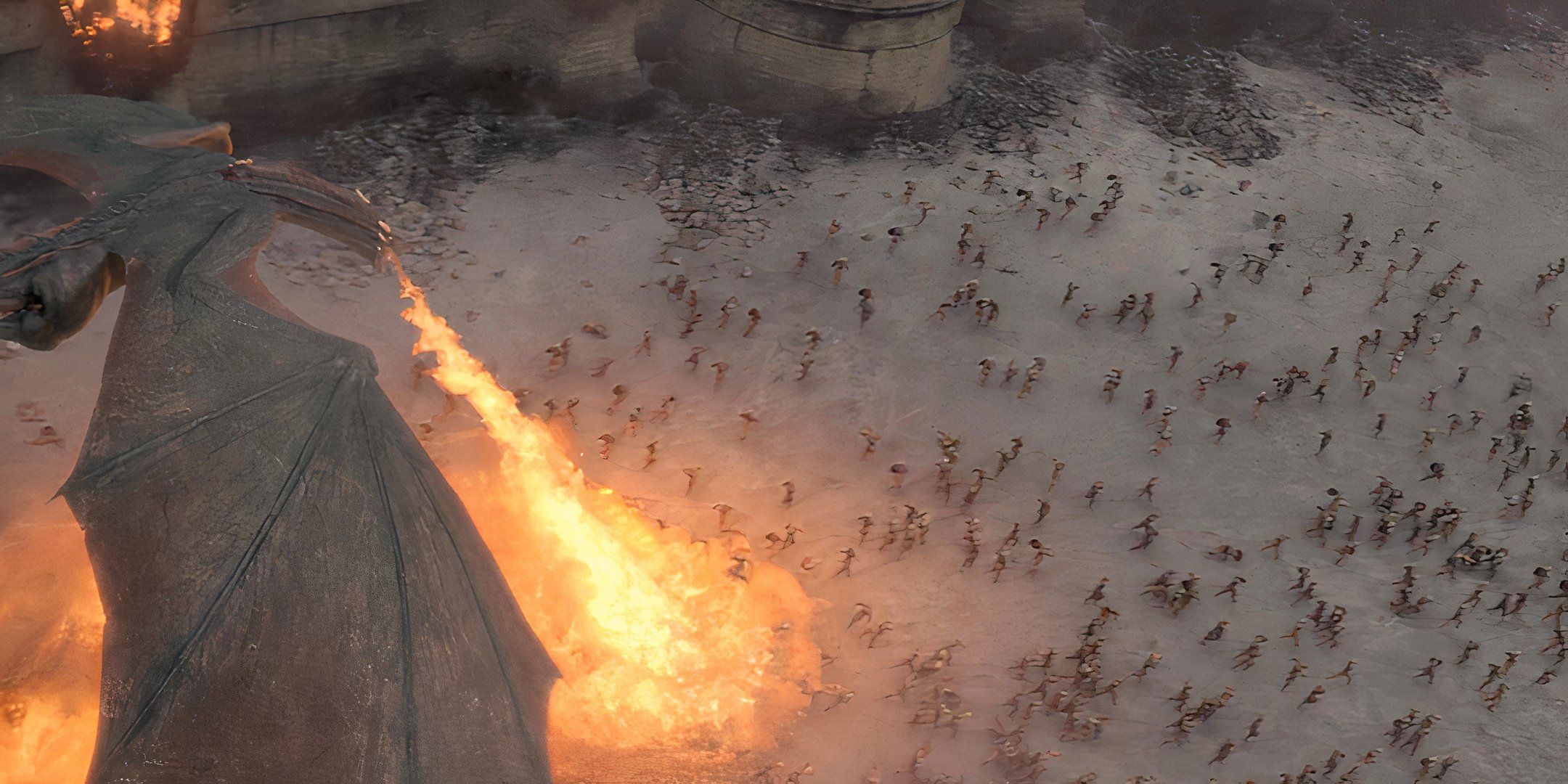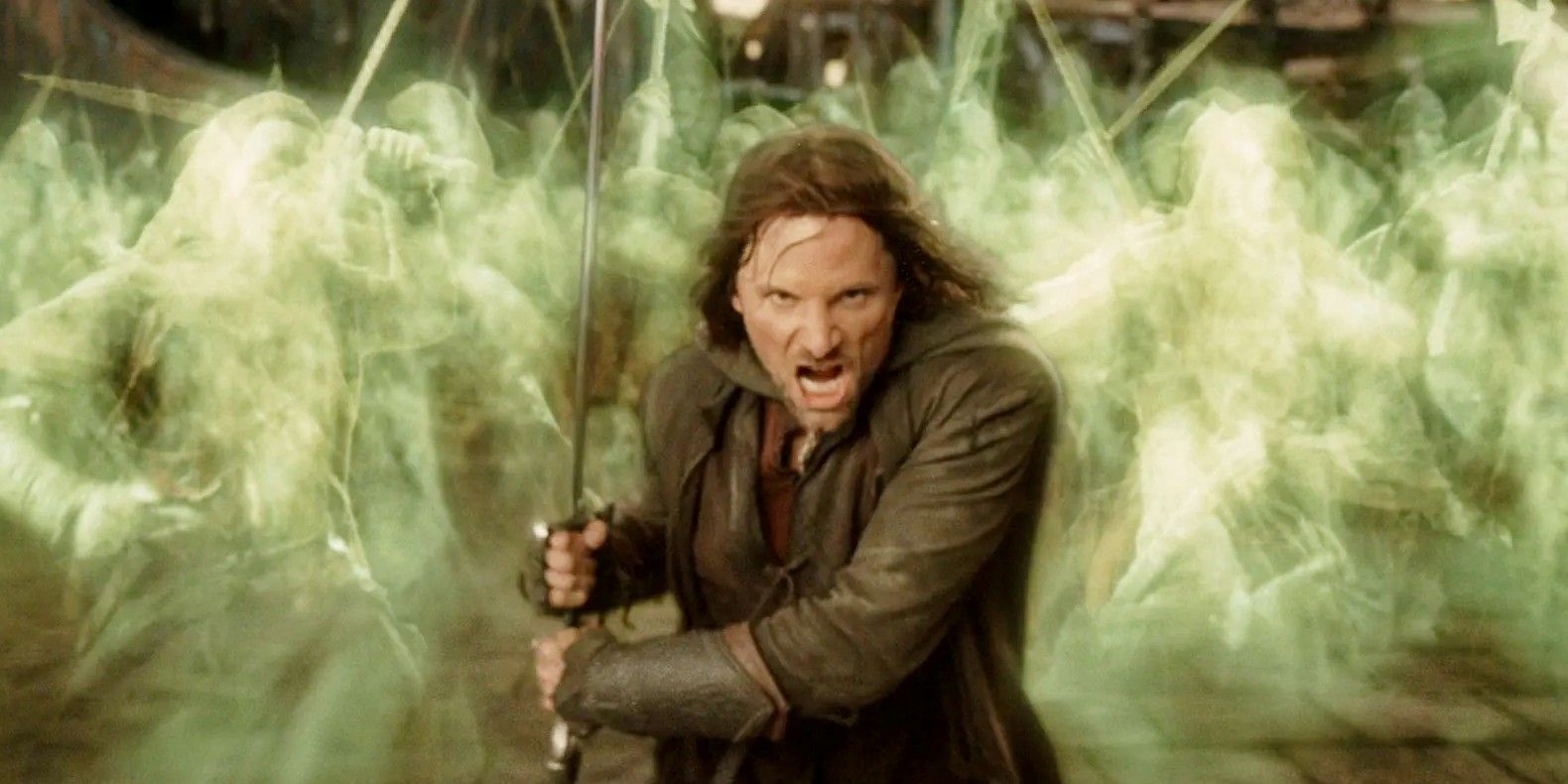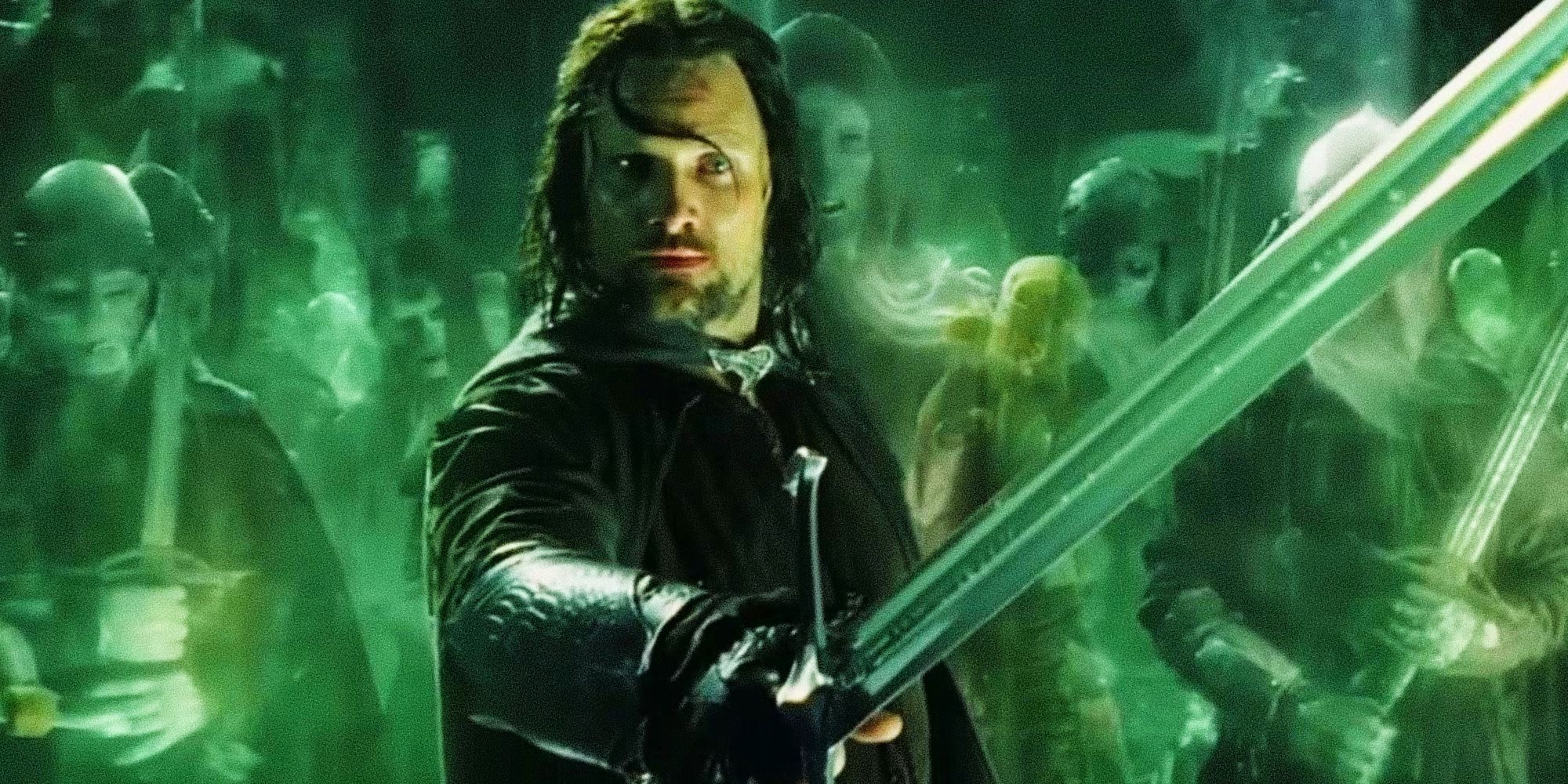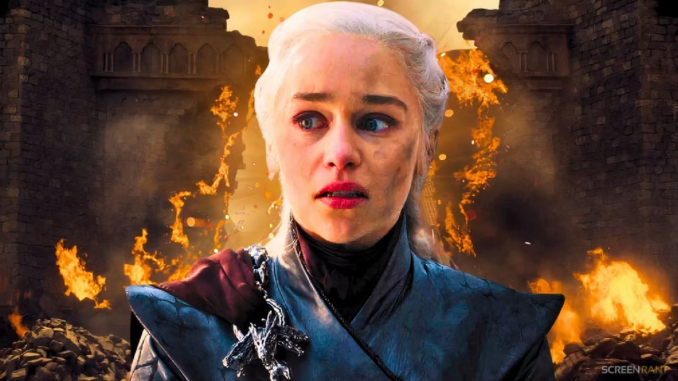
Five years on, Game of Thrones season 8, episode 5, “The Bells” remains strongly disliked, but it does actually reflect George R.R. Martin’s books’ themes in several ways. There was a strong backlash to Game of Thrones‘ ending, and while much of the ire focused on the series finale “The Iron Throne,” there was also plenty directed at other episodes towards the end of its run.
This included Game of Thrones season 8, episode 5, “The Bells,” the penultimate episode of the show, which aired on May 12, 2019. The episode saw Daenerys Targaryen and Drogon burn King’s Landing to the ground, solidifying her late-in-the-game villain arc. It also included the long-awaited Cleganebowl (the fight between Sandor “The Hound” Clegane” and Gregor “The Mountain” Clegane), and the deaths of Jaime and Cersei Lannister. It was an episode with some huge swings, but they didn’t land for everybody.
Why Game Of Thrones Season 8, Episode 5, “The Bells” Is So Strongly Disliked
Daenerys Targaryen Becoming The “Mad Queen” Was Controversial
“The Bells” is one of the worst-received Game of Thrones episodes, pulling in a user score of 5.9/10 on IMDb, the third-lowest overall (behind “The Last Of The Starks” and “The Iron Throne”). The episode was and remains extremely controversial, in large part because of its handling of Daenerys’ story. Her decision to burn King’s Landing was seen as sudden, jarring, and out-of-character, to put it mildly, with plenty of talk that it had ruined her arc or, indeed, the entire show.
| The 10 Lowest-Rated Game Of Thrones Episodes On IMDb | ||
|---|---|---|
| Season/Episode # | Title | Rating (#/10) |
| Season 8, Episode 6 | “The Iron Throne” | 4 |
| Season 8, Episode 4 | “The Last Of The Starks” | 5.5 |
| Season 8, Episode 5 | “The Bells” | 5.9 |
| Season 8, Episode 3 | “The Long Night” | 7.5 |
| Season 8, Episode 1 | “Winterfell” | 7.6 |
| Season 5, Episode 6 | “Unbowed, Unbent, Unbroken” | 7.9 |
| Season 8, Episode 2 | “A Knight Of The Seven Kingdoms” | 7.9 |
| Season 5, Episode 1 | “The Wars To Come” | 8.3 |
| Season 5, Episode 2 | “The House Of Black And White” | 8.3 |
| Season 6, Episode 6 | “Blood Of My Blood” | 8.3 |
The deaths of Jaime and Cersei also came in for heavy criticism, not only because of the former’s already divisive decision to return to his sister’s side, but because of the way they were killed by falling rubble in the Red Keep. The pacing issues that were prevalent throughout much of Game of Thrones season 8 were also a problem here, and resulted in it becoming one of the most disliked episodes of the entire series. Despite that, there are strong themes underpinning the installment, which very much fit with George R.R. Martin’s works.
Game Of Thrones Season 8, Episode 5 Captured The True Horrors Of War
The Impact On The People Of King’s Landing Was Properly Shown
What “The Bells” does particularly well is as a result of Daenerys’ actions, and that’s show the true horrors of war. While Game of Thrones has multiple epic battles and Westeros is at war throughout much of its run, the point is to show that there aren’t really any victors, especially not where the people – in the broadest sense – are concerned. Cersei may say that “when you play the game of thrones, you win or you die,” but that’s only true for the noble lords. For the smallfolk, there’s not really any playing and certainly no winning, only dying.
Few episodes achieve this better than “The Bells,” which, alongside shots of Dany on dragonback and Jon Snow in among the fighting, makes sure to show exactly what’s happening to the common people of King’s Landing.
Few episodes achieve this better than “The Bells,” which, alongside shots of Dany on dragonback and Jon Snow in among the fighting, makes sure to show exactly what’s happening to the common people of King’s Landing. How they’re trapped in what essentially becomes a sheer, inescapable hell. Men, women, and children are killed indiscriminately; people are sexually assaulted in the street; the innocents die just the same as any soldier.
When the episode switches to Arya Stark’s perspective, it’s an extreme close-up of it. Bodies are burned to a crisp. People are killed where they stand. Families are torn apart. The only thing that silences the screams of children is their own deaths. Yet there are still heroes, like Nora (who helps Arya), attempting to do the right thing. This is war at its least glamorous and most horrific. Its most futile. This is war with no winners, only those who die and those who survive. This is war as hell, which is exactly what Martin intends it to be.
“The Bells” Focused On What George R.R. Martin Does Best With His Characters
Game Of Thrones’ Characters Should Be Morally Gray
George R.R. Martin’s characters should not be black and white, nor good and evil. There are heroes and villains, sure, but most characters are supposed to be morally gray, which is something that Game of Thrones season 8, episode 5, “The Bells,” understands. Daenerys becomes the villain, but through trying to be the hero of her own story. Her actions are despicable, but the episode does explain them.
Martin subscribes to a belief of William Faulkner’s, that “the only thing worth writing about is the human heart in conflict with itself.” This is seen throughout A Song of Ice and Fire and Game of Thrones, but it’s very much on display in “The Bells” with Daenerys’ story. It is exactly what she is experiencing; in part, it is the point of her arc in this episode.
[Daenerys] also desired the Iron Throne, she desired a love that was not forthcoming, and, of course, she desired revenge for what her family had lost…
There’s the Daenerys that she wanted to be: the good, beloved, benevolent ruler, who would be celebrated upon her return to her homeland, and break the wheel in a way that benefited the many, not the few. But she also desired the Iron Throne, she desired a love that was not forthcoming, and, of course, she desired revenge for what her family had lost, and what had been taken away from her personally. Her heart was in conflict but, since there was no love, fear won.
Daenerys Burning King’s Landing Paid Off GRRM’s Idea Of Dragons As Nuclear Weapons
Drogon Was Fully Unleashed In Game Of Thrones Season 8
More than ever before, Game of Thrones‘ “The Bells” unleashed the full fire and fury of Daenerys’ biggest dragon, Drogon. It had previously been seen in season 7, episode 4, “The Spoils of War,” but there it was meeting an army in an empty field. Here he was burning an entire city to the ground, killing countless people along the way. Previously, perhaps, it could be argued that Daenerys’ dragons were like an airstrike: powerful forces from above, but they had been combated (killed by the Night King and Euron). That wasn’t the case here.
This was akin to Dany and Drogon going nuclear, razing down everything and everyone that stood before them; the big red button had been pushed. And that is sort of the point of dragons in A Song of Ice and Fire. Or rather, a point. They are complex, magical creatures, and their role is multi-faceted, but one idea is that they show the power and dangers of nukes. In an interview with Vulture back in 2011, Martin said:
“Dragons are the nuclear deterrent, and only Dany has them, which in some ways makes her the most powerful person in the world. But is that sufficient? These are the kind of issues I’m trying to explore. The United States right now has the ability to destroy the world with our nuclear arsenal, but that doesn’t mean we can achieve specific geopolitical goals. Power is more subtle than that. You can have the power to destroy, but it doesn’t give you the power to reform, or improve, or build.”
That last line is particularly important when it comes to Daenerys’ actions in “The Bells.” She had long sought to do exactly those things Martin talks about: reform, improve, build. But in the end, with herself on dragonback and an army on the ground, she was only able to destroy. In an essay on The Bulletin of Atomic Sciences, Timothy Westmyer further explored the connection between dragons and nukes, writing:
“Nuclear deterrence is often characterized as preventing war between two or more nuclear powers. But stabilizing concepts such as mutually assured destruction don’t exist in Martin’s world. As the only one with dragons, Daenerys sacks cities and instills terror in her adversaries. Her ancestor, Aegon the Conqueror, was sole possessor of dragons when his invasion targeted a massive stone stronghold; its castle walls melted under intense dragonfire and they now exist under a cursed legacy, like the firestorms that razed Hiroshima and Nagasaki. Those cities largely recovered, but the legacy of radiation illnesses and cancer lingers to this day.”
Game Of Thrones Season 8’s “The Bells” Subverted Fantasy Tropes
Daenerys’ Story Worked As A Dark Mirror To Lord Of The Rings
Martin wrote A Song of Ice and Fire, in part, as a response to the many fantasy stories that were simply copying The Lord of the Rings and reusing the same tropes. He wanted to subvert them. And that is something, whether audiences liked it or not, that is at play in “The Bells,” and another reason why Daenerys burning King’s Landing will almost certainly happen in the books, too, in some way.
…There are also powerful ideas and themes here that come straight from Martin’s works, and they ring loudly throughout “The Bells.”
There are a few Lord of the Rings parallels with Daenerys – Boromir and Gollum are perhaps the two most obvious, corrupted by their pursuit of one symbol of absolute power – but her arc in “The Bells” also works as a reversal of Aragorn’s story. Though it’s Jon Snow who is often seen as the Arargon figure, Dany is a dark mirror: where he was the good, heroic King returning triumphant to win the day and eventually take the crown, she is the “Mad Queen,” whose return only instills fear and devastation.
Game of Thrones season 8, episode 5 is not a perfect episode of the show. There are flaws, much like there are across its entire final season. And, of course, it is intensely disliked. But there are also powerful ideas and themes here that come straight from Martin’s works, and they ring loudly throughout “The Bells.”

